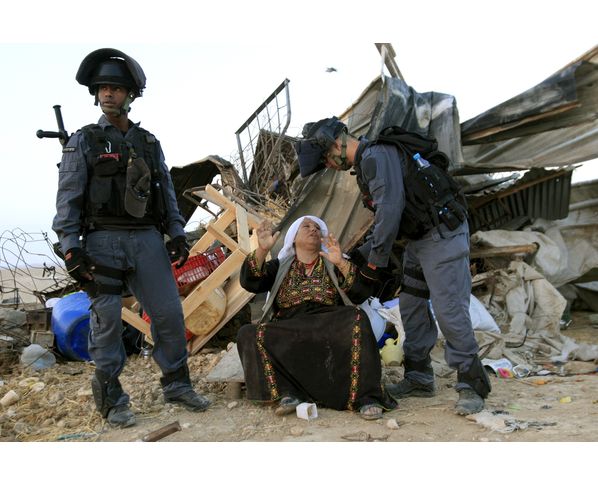Targeting Palestine’s Habitat

On 9 December 2011, an Israeli air raid at a militant training ground caused a nearby house to collapse, killing a Palestinian father and his 12-year-old son and wounding 10 other civilians. Following the Israeli attack, Gaza militants fired 12 rockets at southern Israel. None of the rockets caused casualties or damage.
Two days later, a night-time Israeli air raid made a direct hit on a house in the residential Gaza City neighborhood of al-Zaita, wounding a man and his 10-year-old daughter.
The attacks on homes and civilian casualties in recent months have been part of tit-for-tat exchange between Israeli forces and alleged armed militants. However, the pattern of targeting Palestinian homes has a long continuum in Israel’s history of controlling Palestinian territory.
On 9 March 2012, an Israeli warplane’s rocket attack on a car in Gaza, killing two leaders of the Popular Resistance Committees and an unrelated passer-by, initiated a string of extrajudicial killings over the next three days. The attacks killed a total of 18 activists and civilians, leaving a death toll of 18, with 35 injured.
On Monday, 14 March, continuing attacks targeted civilian houses, activists and agricultural sites, killing four and wounding 33. That brought the total number of injuries to 68, and deaths to 22. The incursions damaged about 50 properties over three days.
This renewed violence comes at a time when, despite the supposed re-opening of the Rafah crossing during the Egyptian revolution, severe travel restrictions remain, preventing supplies and creating shortages, causing a fuel crisis, and demoralizing the residents, unable to leave the area.
A similar pattern of attacks came in June, where following an attack to Israel from the Sinai, Israel responded by launching many air raids on different parts of the Gaza Strip, resulting in the death of 8 Palestinians, including 3 civilians, and wounding 14 more Palestinians, including civilians, mostly children.
The sole power plant in Gaza has shut down four times since February, due to chronic fuel shortages, causing rolling power outages of up to 18 hours a day. Two children are said to have died in hospital due to these power cuts. The North Gaza water treatment and sanitation facility has remained inoperable for the past four months, because Israel refused to allow the necessary fuel to enter the Strip. For that idle period, the only option remains for untreated sewage to empty into the sea.
Ambulances and fire trucks have been taken out of service, and bakeries have been forced to reduce their hours as petrol pumps ran dry across Gaza. This current crisis is partly due to a crackdown on tunnels by Egypt, and tandem reluctance of both Egypt and Israel to supply Gaza.
Legal Prohibitions
The Palestinian Centre for Human Rights called upon the international community to take action under Article 146 of the Fourth Geneva Convention, which requires that the Contracting Parties prosecute persons alleged to commit grave breaches that constitute war crimes under Article 147 of the same Convention and under Protocol I additional to Geneva Conventions.
Despite explicit prohibitions under the 4th Geneva Convention, Israel has targeted Palestinian agricultural plots and houses, resulting in gross violations of housing and land rights in the conduct of war and occupation. With the high population density in Gaza, multiple families often live in one unit and, therefore, the attack on buildings kill, wound and/or displace many people as “collateral damage.” The military destruction of homes in any case constitutes a form of collective punishment when conducted outside the strict criterion of military necessity.
This gratuitous destruction forms a long pattern. HIC-HLRN has catalogued the targeting of homes shelters and shelter seekers as a consistent Israeli military doctrine in Palestine and the region. Such was the subject of HIC-HLRN’s 2009 submission to the UN Fact-finding Mission on the Gaza Conflict (Goldstone Commission).
Outside Gaza, Israel continues to defy international law by demolishing 467 Palestinian homes in the West Bank as of 1 November last year, displacing 869 people. This contravenes the 4th Geneva Convention, which forbids the occupying power to destroy civilian property outside of the military necessity criterion. Meanwhile, construction continues on illegal settler colonies, with at least 507 housing units currently being built, flouting international and even domestic Israeli law.
As part of the follow-up to the 2008–09 Gaza conflict and UN fact-finding report, and following her mission to Israel/Palestine last year, the UN High Commissioner for Human Rights Navanethem Pillay recently presented a new report on the human rights situation in the occupied Palestinian territory to the UN Human Rights Council at its 19th session in Geneva, Switzerland. The report advised Israel to “cancel any plans to transfer Bedouin communities from the West Bank that may amount to forced transfer and/or forced evictions,” to lift fully the blockade on the Gaza Strip, and fully comply with the International Court of Justice Advisory Opinion concerning the illegality of the Israeli-built Wall through the West Bank. The report also emphasizes Israel’s legal obligation to respect and ensure respect for the Fourth Geneva Convention of 1949, which carries an obligation to search for and prosecute before its courts individuals suspected of grave breaches of international humanitarian law (i.e., war crimes and/or crimes against humanity).
|